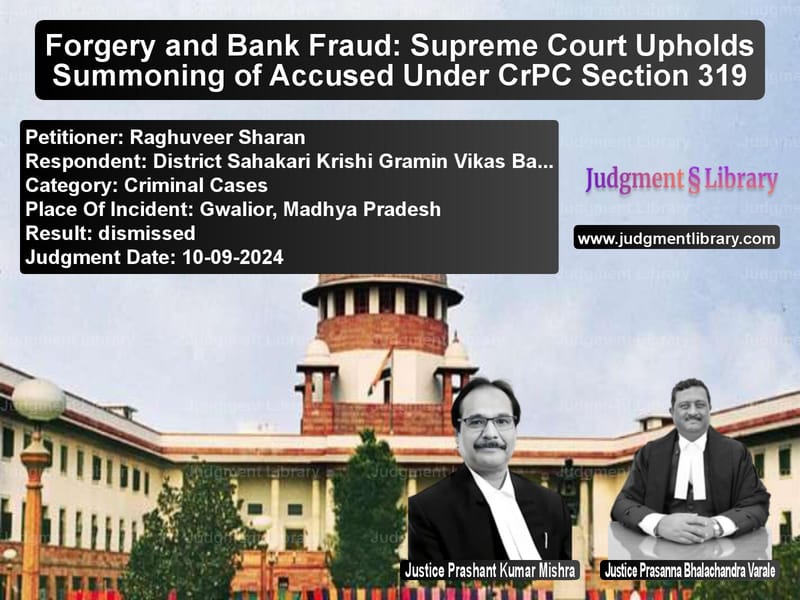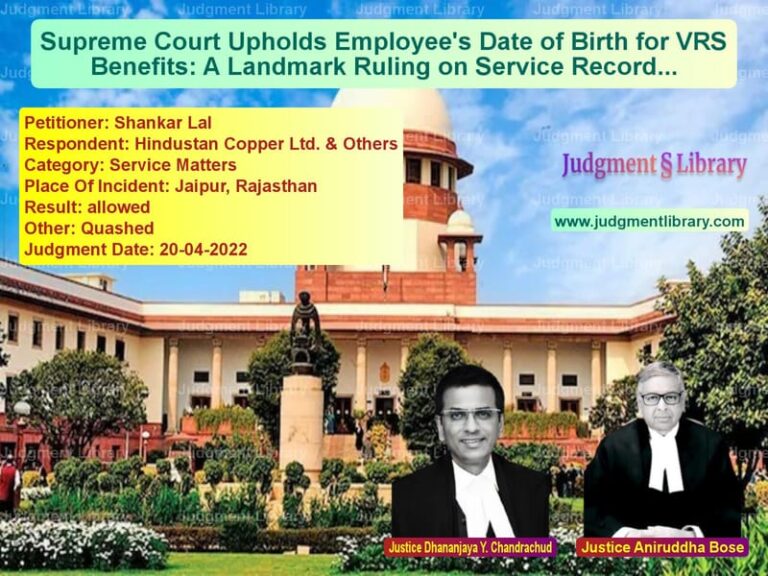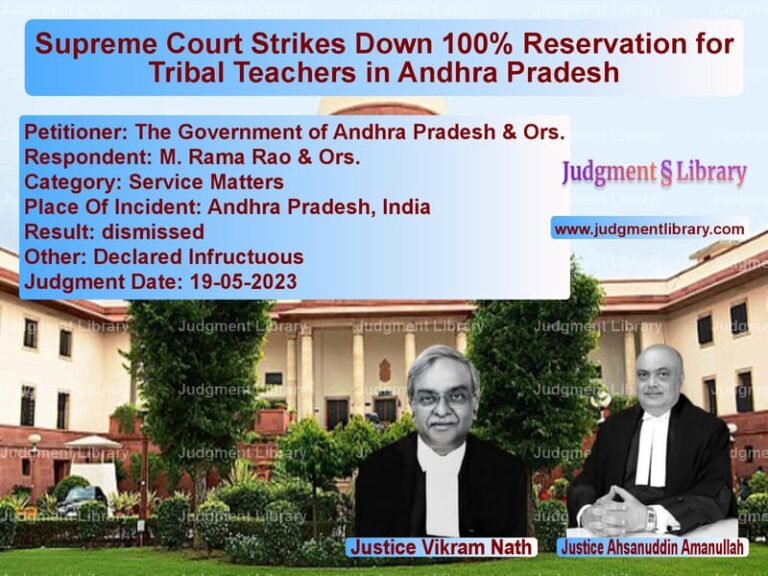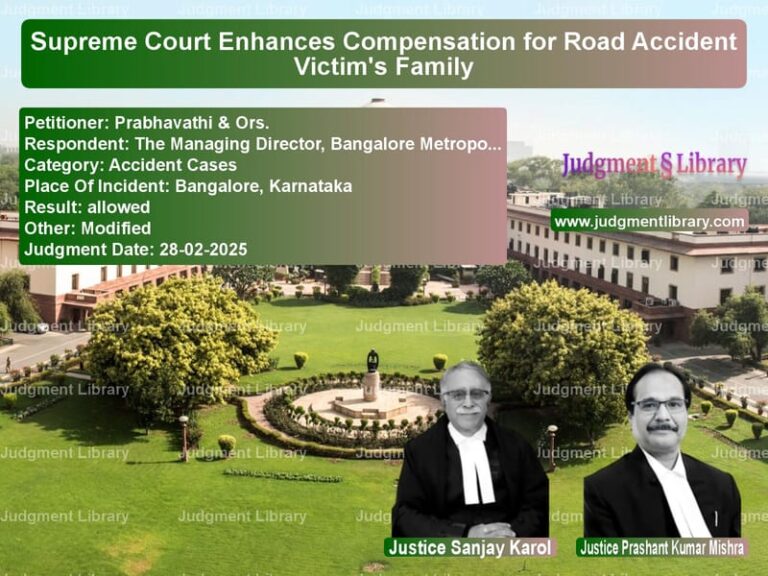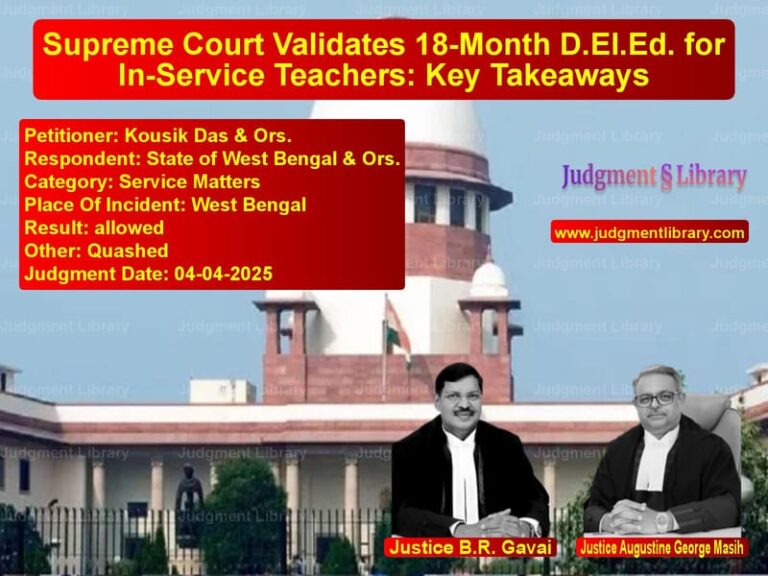Forgery and Bank Fraud: Supreme Court Upholds Summoning of Accused Under CrPC Section 319
The case of Raghuveer Sharan vs. District Sahakari Krishi Gramin Vikas Bank & Anr. revolved around the invocation of Section 319 of the Criminal Procedure Code (CrPC) in a bank fraud and forgery case. The Supreme Court dismissed the appellant’s plea against his summoning as an accused, affirming that there was prima facie evidence justifying the addition of the accused to the ongoing trial.
Background of the Case
The case stemmed from a fraud committed in 1998 at the District Sahakari Krishi Gramin Vikas Bank. The bank’s then-President, Rajendra Bharti, allegedly facilitated fraudulent fixed deposits in the name of his deceased mother, Savitri Shyam, who was also a trustee of a charitable institution. The fraud involved:
- Depositing Rs. 10,00,000 into fixed deposits for three years in the name of the institution.
- Subsequent alteration of the deposit tenure to 10 years and later to 15 years by forgery.
- Alterations made under the initials of the appellant, Raghuveer Sharan, who was employed as the bank’s cashier at the time.
Upon the bank discovering the fraud, a criminal complaint was filed, and the appellant was initially examined as a prosecution witness. However, as more evidence surfaced, the trial court invoked Section 319 of CrPC to summon him as an additional accused.
Key Legal Issues
- Was there sufficient prima facie evidence to summon the appellant as an accused under Section 319 CrPC?
- Did the appellant enjoy immunity under Section 132 of the Indian Evidence Act, 1872, which protects witnesses from self-incrimination?
- Does the accused’s initial role as a prosecution witness exempt him from being later charged?
Arguments by the Appellant (Raghuveer Sharan)
The appellant, represented by senior counsel, contended that:
- His name was not initially mentioned in the FIR or the original complaint.
- His involvement was discovered much later and relied upon testimony given under duress.
- Under Section 132 of the Indian Evidence Act, he should be granted immunity because he was compelled to testify as a prosecution witness.
- CrPC Section 319 should only be applied in exceptional cases where overwhelming evidence points to the accused’s involvement.
Arguments by the Respondent (District Sahakari Krishi Gramin Vikas Bank)
The bank countered the appellant’s arguments, stating:
- The appellant was a key facilitator of the fraud, and there was direct evidence that he altered bank records.
- His initials were found on the altered deposit documents, proving that he knowingly participated in the fraud.
- His immunity claim under Section 132 of the Evidence Act was invalid, as his involvement was corroborated by other witnesses.
- Summoning under Section 319 CrPC was justified because additional material evidence came to light during the trial.
Supreme Court’s Observations
1. Applicability of CrPC Section 319
The Court affirmed that the power under Section 319 CrPC is meant to bring additional accused into the trial if fresh evidence emerges. The ruling stated:
“Section 319 of CrPC allows the court to proceed against any person not initially named as an accused if evidence collected during the trial establishes a strong prima facie case.”
2. Protection Under Section 132 of the Evidence Act
The Court rejected the appellant’s argument that his testimony as a prosecution witness shielded him from prosecution, holding:
“The statutory protection under Section 132 does not extend to a situation where the witness is subsequently found to have played an active role in the crime based on independent evidence.”
3. Importance of Witness Testimonies
The Supreme Court noted that the trial court’s decision to summon the appellant was based on the testimony of PW-1 (Narendra Singh Parmar), recorded on March 31, 2022, which directly implicated the appellant. The Court observed:
“The witness has categorically stated that the accused personally altered the tenure of the fixed deposit, confirming his role in the fraud.”
4. No Blanket Immunity for Witnesses
The Court emphasized that merely because an individual was initially a witness does not mean they cannot be summoned as an accused if independent evidence implicates them:
“An absolute bar against prosecuting a witness would enable perpetrators of crimes to manipulate investigations and avoid liability.”
Final Judgment
The Supreme Court dismissed the appeal, upholding the summoning order under Section 319 CrPC:
“The appeal is devoid of merit. The trial court’s order summoning the appellant as an accused is upheld, and the trial shall proceed in accordance with the law.”
Impact of the Judgment
This ruling clarifies several legal principles regarding witness immunity and summoning additional accused:
- CrPC Section 319 has a broad scope: If new evidence emerges during trial, a previously uninvolved person can be added as an accused.
- Witnesses are not immune from prosecution: Section 132 of the Evidence Act does not provide blanket immunity if independent evidence implicates a witness.
- Fraudulent banking practices face strict scrutiny: The ruling sends a strong message about the legal consequences of altering financial records.
This judgment reinforces the principle that criminal liability cannot be avoided merely by testifying as a witness and ensures that legal mechanisms remain robust in tackling financial fraud.
Petitioner Name: Raghuveer Sharan.Respondent Name: District Sahakari Krishi Gramin Vikas Bank & Anr..Judgment By: Justice Prashant Kumar Mishra, Justice Prasanna Bhalachandra Varale.Place Of Incident: Gwalior, Madhya Pradesh.Judgment Date: 10-09-2024.
Don’t miss out on the full details! Download the complete judgment in PDF format below and gain valuable insights instantly!
Download Judgment: raghuveer-sharan-vs-district-sahakari-kr-supreme-court-of-india-judgment-dated-10-09-2024.pdf
Directly Download Judgment: Directly download this Judgment
See all petitions in Fraud and Forgery
See all petitions in Bail and Anticipatory Bail
See all petitions in Money Laundering Cases
See all petitions in Judgment by Prashant Kumar Mishra
See all petitions in Judgment by Prasanna Bhalachandra Varale
See all petitions in dismissed
See all petitions in supreme court of India judgments September 2024
See all petitions in 2024 judgments
See all posts in Criminal Cases Category
See all allowed petitions in Criminal Cases Category
See all Dismissed petitions in Criminal Cases Category
See all partially allowed petitions in Criminal Cases Category

